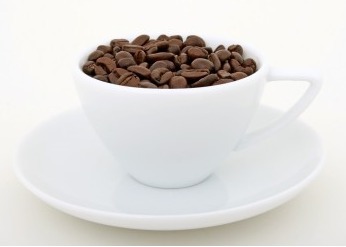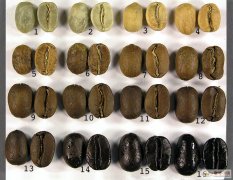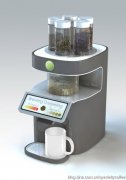The roasting level of coffee indicates that the baking depth is deepened step by step.

Coffee roasting
The baking depth listed below is deepened one by one.
Raw bean (Green Coffee)
The appearance of the beans that have not been baked is green, and the color will change with the degree of baking.
Light baking (Light Roast)
The most mild baking method, the appearance is wheat color, after extraction there is no fragrance, bitter taste, not suitable for drinking
Cinnamon baking (Cinnamon Roast)
Light baking method, the appearance is cinnamon color, more fragrant than Light Roast encounter sour quality beans, this baking method can stimulate its sour taste.
Medium baking (Medium Roast)
Moderate baking shows chestnut color, beginning to produce sour and bitter taste, soft taste, suitable for the blending of sour American coffee.
Medium baking (High Roast)
Slightly strong moderate baking, the appearance is brown, sour taste is suppressed, bitterness and sweetness become stronger.
Medium baking (City Roast)
Strongly medium-baked, City refers to New York City, with just the right sour and bitter taste.
Deep baking (Full City Roast)
Deep baking is thicker than City Roast, and you can hardly feel the sour taste.
Deep baking (French Roast)
The deeply roasted beans are light black and feel as if the fat is about to spill over, making them suitable for coffee, Olei and Viennese coffee.
Deep baking (Italian Roast)
Deep-roasted coffee beans are darker in color and more bitter, and are generally used to carve and make coffee in Japan.
Important Notice :
前街咖啡 FrontStreet Coffee has moved to new addredd:
FrontStreet Coffee Address: 315,Donghua East Road,GuangZhou
Tel:020 38364473
- Prev

Roasting principles and classification of coffee beans Roasting characteristics of cities around the world
Roast raw coffee beans to give them a unique color, aroma and taste. The most important thing about frying and baking is that the inside and outside of the beans can be evenly fried and not burnt. 80% of coffee taste depends on roasting, which is the most important and basic condition for brewing good coffee.● The basic principle of frying The most important thing is to be able to fry the inside and outside of the beans evenly
- Next

Draw lessons from the "tea extractor" designed by Espresso coffee machine
China is the origin of tea trees. China's contribution to human beings in the tea industry mainly lies in the earliest discovery and use of tea as a plant to develop it into a brilliant and unique tea culture in China, the East and even the whole world. Chinese tea industry first flourished in Bashu, and then spread to the east and south and spread all over the country. In the Tang Dynasty, it spread to Japan and Korea; after the 16th century, it was
Related
- Detailed explanation of Jadeite planting Land in Panamanian Jadeite Manor introduction to the grading system of Jadeite competitive bidding, Red bid, Green bid and Rose Summer
- Story of Coffee planting in Brenka region of Costa Rica Stonehenge Manor anaerobic heavy honey treatment of flavor mouth
- What's on the barrel of Blue Mountain Coffee beans?
- Can American coffee also pull flowers? How to use hot American style to pull out a good-looking pattern?
- Can you make a cold extract with coffee beans? What is the right proportion for cold-extracted coffee formula?
- Indonesian PWN Gold Mandrine Coffee Origin Features Flavor How to Chong? Mandolin coffee is American.
- A brief introduction to the flavor characteristics of Brazilian yellow bourbon coffee beans
- What is the effect of different water quality on the flavor of cold-extracted coffee? What kind of water is best for brewing coffee?
- Why do you think of Rose Summer whenever you mention Panamanian coffee?
- Introduction to the characteristics of authentic blue mountain coffee bean producing areas? What is the CIB Coffee Authority in Jamaica?

